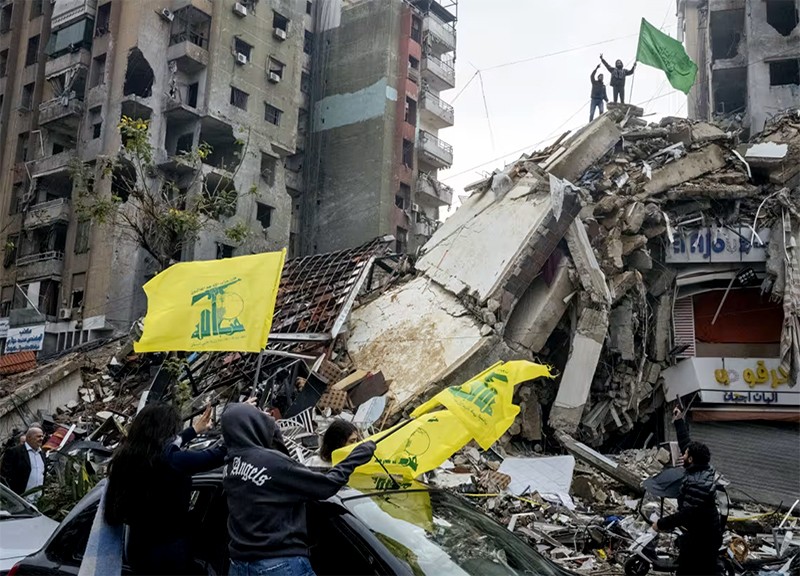
Some in Israel are pressing for an attack against Iran’s nuclear facilities now Tehran is at a disadvantage
By Dov Lieber, WSJ
TEL AVIV-The cease-fire agreement between Israel and Hezbollah brokered this week pulls the Middle East back from the brink of all-out war. But the deal also carries the risk of putting Israel and Iran closer to a direct confrontation.
For more than a year, Iran's allied militias, of which Hezbollah is the central member, have attacked Israel from across the Middle East-the first unified effort by Tehran's so-called axis of resistance to confront Israel. Now, degraded and damaged by a year of war with Israel, that unity is showing the first signs of cracking, leaving Iran exposed.
Hezbollah accepted a cease-fire without extracting concessions for Hamas, its Iran-backed ally in Gaza. The Houthis in Yemen and Shiite militias in Iraq, though united in their hatred of Israel and the U.S., have lowered the tempo of attacks in recent weeks.
Some in Israel see the weakening of Iran and its militias as a moment to exploit, in particular by targeting Tehran's nuclear program. Others warn doing so would move the region onto more unstable footing.
"You could not have better conditions for an Israeli-American campaign against the Iranian nuclear program," said Avner Golov, a former senior director at Israel's National Security Council. "The question is whether the right way is military force."
Despite the cease-fire agreement, Israel launched multiple attacks in Lebanon on Thursday, hitting what it said were advancing militants and launching an airstrike on a facility storing rockets. Lebanese authorities said the latter strike hit near the city of Sidon, just south of Beirut and north of the area where Hezbollah is prohibited from stationing its military forces under the terms of the cease-fire. The Lebanese army accused Israel of violating the agreement by breaching Lebanese airspace and striking Lebanese territory.
Israeli Prime Minister Benjamin Netanyahu on Tuesday said a cease-fire in Lebanon would allow Israel to concentrate on preventing Iran from acquiring nuclear weapons.
Israel has eliminated much of Iran's air defenses, he said. It has threatened action against Iran's nuclear facilities if it believes that would be the only way to prevent Tehran from developing nuclear weapons.
"This trend is going towards de-escalation," Yoel Guzansky, a senior fellow at Tel Aviv University's Institute for National Security Studies. "But what can take us towards escalation is direct confrontation between Israel and Iran."
Until now, Israel lacked the bombers and bunker busters needed to destroy Iran's underground nuclear facilities, said William Wechsler, senior director of Middle East Programs at the Atlantic Council. With Iran stripped of air defenses, and Hezbollah and Hamas in disar ray, "I think the odds of strikes on the Iranian nuclear program are materially higher than they have been in the past."
Iran's nuclear facilities are dispersed across the country and some are fortified deep underground, making any at tempt by Israel to destroy them a military challenge that could place the region back on the precipice of wider conflict.
Iran also faces a dilemma. Weaponizing the nuclear program could create deterrence it has lost from its degraded allies, but it would also invite attacks, said Golov, now vice president of MIND Israel, a national-security advisory group.
President-elect Donald Trump, who has said he wants to end the conflicts in the Middle East, might be open to a one-time operation against Iran, some analysts say.
At the same time, Golov said, Israel would be in a bind if Trump prefers to try to make a deal with Iran. Without U.S. support, Israel would struggle to conduct an effective military campaign against Iran, he added.
Iranian officials have been sending signals since Trump's election that they would be prepared to engage in diplomatic efforts on the nuclear program. Trump has said he isn't seeking to oust Iran's leadership and doesn't want a conflict with the country.
Preventing Hezbollah's rearmament is also a key goal for Israel, which has increased at tacks in recent months inside Syria, the main weapons smuggling route into Lebanon.
Israel wagers that military pressure, combined with potential economic incentives from the Gulf countries, will persuade Syrian leader Bashar al-Assad to abandon his alliance with Iran and close off the smuggling routes.
With Hezbollah diminished, Israel is free to focus on Hamas in Gaza. That presents a route toward a quick de-escalation, but also gives Israel the free- dom to deepen its military control of the enclave and wage a long-term counterinsurgency.
Hamas on Wednesday said it was ready to go back to the negotiating table. The U.S.-designated terrorist organization is under pressure from Arab mediators to be more flexible in its demands given its new isolation, Arab officials said.
Egypt, the main mediator and the country with the most leverage over Hamas, has told the group that its hopes of expanding the conflict and demands for a full Israeli withdrawal from Gaza in exchange for freeing the 101 hostages being held in the enclave are no longer realistic, Arab officials said. Egypt also told Hamas to expect Israel would retain veto rights over who would govern the enclave after the war.
Israel has set the goals of destroying Hamas's military and governing capabilities, and ensuring the Gaza Strip won't be a threat to Israel.
"We are not at the end of the beginning," said Avi Dichter, Israel's agriculture minister, a member of the security cabinet. "But we are definitely not at the beginning of the end, because we still have a lot of work to do."














